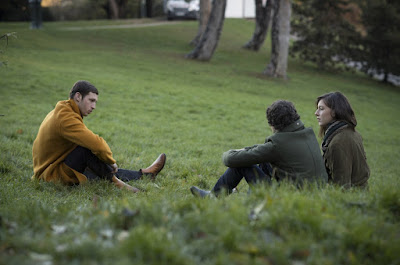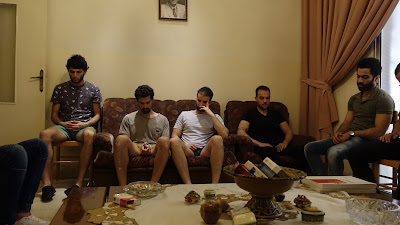Not that this exceptionally creative, challenging and deeply unsettling filmmaker has that much farther to go. From Nadav Lapid's bizarre and gripping Policeman (2011) through The Kindergarten Teacher (2014) and its unnecessary but certainly acceptable remake (from 2018, which Lapid did not direct) to his newest stunner, SYNONYMS, in which, as ever, his antagonist cannot fully live or maybe even survive while dealing with the horrendous contradictions of life in the hugely divided, corrupt and corrupting state of Israel today.
Mr. Lapid, shown at right, is not only pointing his finger at Israel; France, the country to which our "hero" has come for escape, takes its licks, as well. And any thinking person here in our deeply divided USA watching this film will also, TrustMovies suspects, wince in some kind of guilty, angry recognition.
The hero/antihero this time around is Yoav, a young, unhappy Israeli who seems to be suffering from everything from home-country dysfunction to a case of OCD and, though he understands and can speak some French, is counting on his lightweight French/ Hebrew dictionary to get him through each day.
Yoav is played by an in-every-way impressive newcomer named Tom Mercier (above and below), who gives the kind of performance that is so real, so moment-to-moment strange and compelling that you are not likely to forget it. You're not likely to forget Mercier either, for his face and body -- which we see all of and fairly often (there's ample full-frontal and full-rear nudity) -- are of the sort of that legends are made. Not to objectify here (goodness, no!), but M. Mercier has perhaps the best-looking male posterior in movies, and his frontal view is quite something, too (he often seem to be semi-erect).
Yoav's job -- with a security company that provides this for Israelis in France -- leads us to some marvelous, if strange people and work, all of which is shown in often fast, frenetic scenes that make their point only later, when we've pieced together events and the unsettlingly mixed feelings they've engendered.
There's an extended scene on the Paris subway involving Yoav and his new, hugely troubled friend, that is as suspenseful and anxiety-provoking as any you'll have seen. Lapid's film is also allusion-riddled -- to security and what it means, in France and elsewhere; to the miasma of the military; to Jewish and/or Muslim identity; and especially to the allusiveness of words and their meaning.
Synonyms is also about as homoerotic a movie as I've encountered in a long while, though Lapid never pushes it over the boundary to homosexual. This is an interesting tightrope walk, and the filmmaker -- who both directed and co-wrote the screenplay with his father Haim Lapid -- manages it all with enormous elan. Women are noticeably secondary here -- to be used and enjoyed, of course -- but it's mostly about the power struggles/friendships between the guys.
Visually, Synonyms is Lapid's most impressive work to date (the cinematographer is the filmmaker's usual, Shai Goldman): alternately ravishingly beautiful in its flow and pace, sometimes simply quiet and cold. Once in awhile it goes overboard (in my estimation) but mostly it is almost wildly on-the-mark in the manner in which it keeps us as off-balance as is our hero.
Performances down the line are not simply solid but complete -- especially in the case of Mercier, who will have you thoroughly rooting for Yoav, even though you come to realize that he is lost. Yet perhaps not completely. Is there hope? Lapid may close the door., but I don't think he locks it.










































